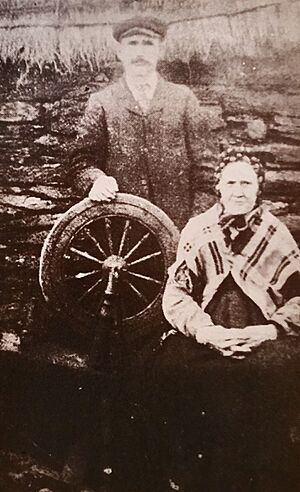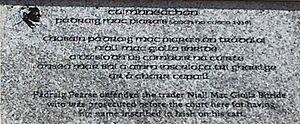Neil McBride (poet) facts for kids
Neil McBride (whose name in Irish was Niall Mac Giolla Bhrighde) lived from 1861 to 1942. He was a farmer, a poet, an author, and a songwriter from a small village called Feymore, near Creeslough in Donegal, Ireland. Neil became famous because he stood up for himself when he was fined for having his name written in the Irish language on his farm cart. His brave actions helped to highlight the importance of the Irish language.
Contents
Neil McBride: Farmer and Poet
Neil McBride spent his whole life in Feymore, a small village in Creeslough. He lived on a hill called Crockatee, which is near Muckish Mountain. Neil made his living as a farmer, often called a cottier back then. He was also a talented poet.
In 1905, Neil published a book of poems called Blaṫa Fraoiċ, which means 'Heather Blossoms'. His poems and songs became very well known across Ireland. Some of his popular works include:
- "The Hills of Donegal"
- "Noreen Bawn" (from 1910)
- "The Castle of Doe"
- "Marble Hill"
- "Mo Chró Beag ag Bun Chnoc a' Tighe" ("My wee shack below Crockatee")
A Historic Moment with the Law
As a farmer, Neil McBride used a cart for his business. Back then, rules said that all business carts had to show the owner's name in English.
On the evening of March 11, 1905, Neil was returning home from the Dunfanaghy Fair, a market in a nearby town. An English police officer, sometimes called a 'bobby', stopped him. The officer fined Neil one shilling. Why? Because the name on his donkey cart was written in Irish, and the officer called it 'illegible' (meaning unreadable). The sign proudly said, "N. MAC GIOLLA ḂRIĠDE FIOḊ-MÓR" in Irish. Neil's friend, Andrew Mac Intyre, who was also a poet, had made the sign.
Neil McBride refused to pay the fine. He decided to defend himself at the Dunfanaghy Petty Session, which was a local court. He lost the case and was fined an extra shilling because he still wouldn't pay.
The Gaelic League Steps In
The Conradh na Gaeilge (which means "Gaelic League") heard about Neil's story. This group worked to promote the Irish language. They wanted to help him. One of their members, a lawyer named Patrick Pearse, saw this as a chance to support Irish independence. He agreed to defend Neil McBride for free (this is called pro bono).
Neil's appeal went to a higher court in Dublin, called the Court of King's Bench. This was Patrick Pearse's first and only time appearing in court as a lawyer. Even though they lost the case, it greatly inspired Pearse. He became a strong political activist. The case also started a national movement to change British government rules about the Irish language.
Patrick Pearse wrote about the court's decision in a newspaper called An Claidheamh Soluis on June 27, 1905. He said the court decided that "Irish is a foreign language on the same level with Yiddish." In his article, he encouraged people in Ireland to support the Irish language. He saw this as a way to show Irish nationalism, which is a feeling of pride and loyalty to one's own country.
Neil McBride's Legacy
Neil McBride's story and his stand for the Irish language left a lasting impact.
Books About Neil
- A local historian and author named Seamus Harkin wrote about Neil's poems and songs in his 1996 book, ‘Poets and People of Doe’.
- Neil McBride himself published a collection of his songs and poems in 1905. It was called 'Blaṫa Fraoiċ’ (‘Heather Blossoms’) Songs in Irish and English by Niall Mac Giolla Bhrighde.
- In 2011, Seamus Harkin updated and reissued 'Blaṫa Fraoiċ’. He added two more songs that Neil had written after the first book came out. Seamus said he printed the book "to let people, especially the young, know the great wealth of talent we had in the parish."
- Liam Ó Connacháin wrote a book about Neil's life in 1939 called "Dírbheathaisnéis Néill Mhic Ghiolla Bhrighde". It was printed again in 1974.
Neil in Music, Radio, and TV
- A radio show about Neil's life and work was broadcast on Radio Éireann in 1936.
- A folk song called "An Trucailín Donn" ("The Little Brown Cart") was inspired by Neil's cart story. It was included in an Irish language songbook in 1975. The band Réalta released this song on their album "Open the Door for Three" in 2012.
- In January 2016, a documentary about Neil McBride and his cart, also called "An Trucailín Donn", was shown on the Irish Gaelic television channel TG4.
Memorials for Neil
- The actual name plate from Neil McBride's cart is on display at the Donegal County Museum in Letterkenny.
- A plaque honoring Neil was placed at the entrance to Doe (Chapel) Cemetery. It was dedicated in 1982.
- On April 18, 2016, a special plaque was unveiled at Dunfanaghy Market Square. This plaque remembers the famous court case involving Neil McBride and Patrick Pearse.
 | Madam C. J. Walker |
 | Janet Emerson Bashen |
 | Annie Turnbo Malone |
 | Maggie L. Walker |



